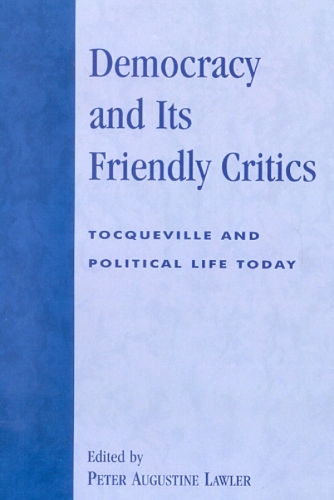
Democracy and Its Friendly Critics: Tocqueville and Political Life Today
(Paperback)
Publishing Details
Democracy and Its Friendly Critics: Tocqueville and Political Life Today
By (Author) Patrick J. Deneen
Contributions by Marc D. Guerra
Contributions by Ralph C. Hancock
Contributions by Matthew S. Holland
Contributions by Joseph M. Knippenberg
Contributions by Peter Augustine Lawler
Contributions by Daniel J. Mahoney
Contributions by Harvey C. Mansfield
Contributions by Wilson Carey McWilliams
Contributions by David K. Nichols
Bloomsbury Publishing PLC
Lexington Books
1st August 2004
United States
Classifications
General
Non Fiction
320.973
Physical Properties
Paperback
204
Width 177mm, Height 228mm, Spine 17mm
313g
Description
In this edited collection, Peter Lawler presents a lucid and comprehensive introduction to a diverse set of political issues according to Tocqueville. Democracy and Its Friendly Critics addresses a variety of modern political and social concerns, such as the moral dimension of democracy, the theoretical challenges to democracy in our time, the religious dimension of liberty, and the meaning of work in contemporary American Life. Taking innovative and unexpected approaches toward familiar topics, the essays present engaging insights into a democratic society, and the contributors include some of today's leading figures in political philosophy. No other collection on Tocqueville addresses contemporary American political issues in such a direct and accessible fashion, making this book a valuable resource for the study of political theory in America.
Reviews
There are many ways to read Tocqueville, but the authors of the essays collected in this extraordinary volume read him in the best way as a partner in conversation about some of the most important issues confronting us today: democracy, America, and the fate of democracy in America. -- Damon Linker, Editor, FIRST THINGS
These friendly critics of democracy go beyond the classic to illuminate American culture and politics. Indeed, these superlative essayists are forced to become friendly critics of Tocqueville in order to complete their work, which culminates, in the most ambitious essays, in the articulation of the relationship between reason and revelation. Thus, the book is an invaluable reminder of the need to understand America as containing within herself the highest themes of political philosophy and hence as possibly the best regime. -- Ken Masugi, The Claremont Institute and editor
Thirteen essays, presented by Lawler, frequently use the observations of de Tocqueville as a jumping off point for their reflections on such topics as religion and materialism, the moral foundations of democracy, citizenship as vocation, and other matters. * Reference and Research Book News *
Here in America, the land of sunny tolerance, it sometimes seems that the criticism of modern egalitarian democracy is the only truly unpardonable offense left a sin that is doubly heinous, since it combines the theological vice of heresy with the political vice of treason. But America deserves better than that, and the good health of democracy requires it. This stimulating and valuable collection gives fresh force to Tocqueville's great and enduring insight, that the liberal-democratic ethos can beat its best only when it is held in tension with the friendly criticism of other principles... -- Wilfred M. McClay, University of Oklahoma
Here in America, the land of sunny tolerance, it sometimes seems that the criticism of modern egalitarian democracy is the only
truly unpardonable offense left a sin that is doubly heinous, since it combines the theological vice of heresy with the political
vice of treason. But America deserves better than that, and the good health of democracy requires it. This stimulating and
valuable collection gives fresh force to Tocqueville's great and enduring insight, that the liberal-democratic ethos can be at its
best only when it is held in tension with the "friendly criticism" of other principles.
Author Bio
Peter Augustine Lawler is Dana Professor of Government at Berry College.
